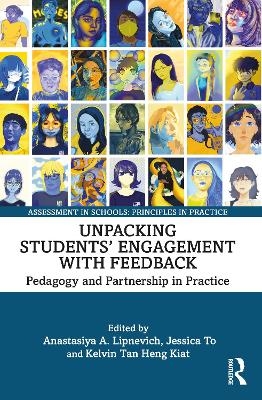
Unpacking Students’ Engagement with Feedback
Routledge (Verlag)
978-1-032-32041-0 (ISBN)
This volume offers insights into the complexity of students’ engagement with feedback, the diversity of teachers’ feedback practices, and the influence of personal assessment beliefs in tension with prevailing contexts. It focuses on two main sections: what is students’ engagement with feedback? And what is the variety of teachers’ feedback practices? Under these themes, the content covers a broad range of key topics pertaining to instructional feedback, how it operates in a classroom and how students engage with feedback. Unarguably, feedback is a key element of successful instructional practices – however we also know that (a) learners often dread it and dismiss it and (b) the effectiveness of feedback varies depending on teacher’s and student’s characteristics, specific characteristic of feedback messages that learners receive, as well as a number of contextual variables. What this volume articulates are new ways for learners to engage with feedback beyond recipience and uptake.
With nuanced insights for research and practice, this book will be most useful to teachers, university teacher educators, and researchers working to design and enact new ways of engaging with feedback in schools and beyond.
Anastasiya A. Lipnevich is a professor of educational psychology at Queens College and the Graduate Center of the City University of New York. Her research interests include instructional feedback, formative assessment, alternative ways of cognitive and non-cognitive assessment, and the role of psychosocial characteristics in individuals’ academic and life achievement. Jessica To is an education research scientist at National Institute of Education (NIE), Nanyang Technological University. Her research interests lie in learner-centered feedback designs, feedback partnerships, peer and self-assessment as well as dialogic use of exemplars. Kelvin Tan Heng Kiat is an associate professor with National Institute of Education’s Learning Sciences and Assessment Academic Group. He instructs school leaders in the Leadership in Education program in NIE for learning, and his research interests are on assessment literacy and leadership.
1. The many dimensions of student engagement with instructional feedback
Part 1: What is students’ engagement with feedback?
2. What happens in the black box in which students engage with feedback?
3. Students’ Emotions in Feedback Engagement
4. Receptivity to Instructional Feedback
Part 2: What is the variety of student feedback practices?
5: A typology of feedback practices
6. How do students experience assessment feedback?
7. How do teachers experience assessment feedback?
8. Feedback pedagogy and its implications for feedback partnership(s)?
9. What did we learn and where do we go from here?
| Erscheinungsdatum | 03.11.2023 |
|---|---|
| Reihe/Serie | Assessment in Schools: Principles in Practice |
| Zusatzinfo | 6 Tables, black and white; 14 Line drawings, black and white; 18 Halftones, black and white; 32 Illustrations, black and white |
| Verlagsort | London |
| Sprache | englisch |
| Maße | 156 x 234 mm |
| Gewicht | 272 g |
| Themenwelt | Sozialwissenschaften ► Pädagogik ► Erwachsenenbildung |
| ISBN-10 | 1-032-32041-9 / 1032320419 |
| ISBN-13 | 978-1-032-32041-0 / 9781032320410 |
| Zustand | Neuware |
| Informationen gemäß Produktsicherheitsverordnung (GPSR) | |
| Haben Sie eine Frage zum Produkt? |
aus dem Bereich


